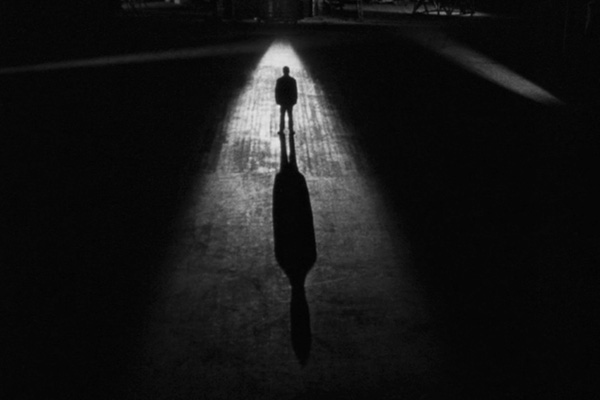by Richard Fleischer
A Feminist Analysis
Is Fantastic Voyage a Poe?
(Nathan) Poe’s Law states, “Without
a winking smiley or other blatant display of humor, it is utterly impossible to
create a parody of (religious) Fundamentalism that someone won’t mistake for
the real thing.”
Upon seeing Fantastic Voyage, for some time I struggled to understand whether
it was a parody of sexism, or perhaps the most sexist film I have ever
seen.
The reader has already surmised
that Fantastic Voyage fails the Bechdel Test (on two of
its three points.) Besides Raquel Welch, there are two women in the film—both
nurses. The only woman other than Welch who has a line (and I mean one line) makes a massive blunder and
endangers the lives aboard the Proteus, a sort of submarine shrunk to a
microscopic scale that it may enter a human’s blood stream to perform laser
surgery.
Of the Proteus crew’s five members, the lone woman, Raquel
Welch, was the last to speak a first line. Before she said one word, and while she was in the room with
her crew mates, the general in charge of mission control vehemently disagreed with
her inclusion, “This mission is no place for a woman.” Later, the hero of the
five, the most earnest of the film’s men, condescended, introducing himself by
asking her if she had any tricks in the kitchen. Later, twice in the film a man
springs to her rescue, once leading her by the clichéd, condescending hand.
 Welch was the only character we saw
in a full shot who removes her coveralls. It revealed a flattering wet suit,
duplicates of which the men later wear. Yet hers was the only that was ever
zipped down in front to cleavage levels. To be sure, Raquel Welch is as good
looking a woman as has ever made a movie, but her character was nearly no more
than eye candy. The writers provided her character with no personality, no
story, and no color. She was there to be pretty and, rather sinisterly, to be
another suspect in our search for the ship’s saboteur.
Welch was the only character we saw
in a full shot who removes her coveralls. It revealed a flattering wet suit,
duplicates of which the men later wear. Yet hers was the only that was ever
zipped down in front to cleavage levels. To be sure, Raquel Welch is as good
looking a woman as has ever made a movie, but her character was nearly no more
than eye candy. The writers provided her character with no personality, no
story, and no color. She was there to be pretty and, rather sinisterly, to be
another suspect in our search for the ship’s saboteur.
One could argue that the film’s
treatment of Welch’s character wasn’t 100% sexist—a strange hill to die
on. After all, she was included in
the crew, she did serve as an image of a professional surgical/research
assistant, and she was never part of a romantic storyline. Edmond O’Brien’s
character, Welch’s sexist belligerent, was unsympathetic. But all of these
curiously conceived contortions collapse upon noticing that even the handsome
leading good guy, Stephen Boyd, was condescending and sexist toward her. Not to
mention that her character was of course the assistant and never the lead.
Despite the film’s inclusion of
three women, race diversity was absent. This movie has white people only.
Granted, NASA’s Apollo 11 mission control in 1969 was entirely white (and
entirely male), but the beauty of film, and the power of science fiction in
particular, is the ability to create new realities that challenge current
thinking. Unfortunately, the imagining stopped after the writers thought to
shrink things—small minds, indeed.
To cap the film’s dominant-group
arrogance, with a plot dependent on the science (fiction) of miniaturization, Fantastic Voyage found plenty of space to espouse
ignorant, anti-science views. The surgeon argued with the hard science guy about
evolution. The surgeon made two comments that often co-occur: 1) He
misrepresented evolution as a process driven by “chance” (though mutations and
common descent contain elements of chance, the primary mechanism of evolution,
natural selection, is not a chance proposition) and 2) He thinks that evolution
and natural selection are not real. For a “leading surgeon” in his field, this
surgeon is embarrassingly and frighteningly ignorant and perhaps stupid. Regarding
the rest of the film’s science accuracy, I am sure that scientists have much to
critique, but I shall leave that to them.
I will however lament that, once
again, the scientist—the one who understand evolution and natural selection—is
the bad guy. He is the saboteur. How many times must science and its
practitioners be seen as the villain?
The predecessor to InnerSpace (1987), Fantastic Voyage was primarily an offensive, dated product. Its
special effects were a bit nice to see for historical purposes, and its basic
premise was interesting enough to ponder, but one should not be able to get
through this film without a shocking maltreatment of women and science. If you
want to see special effects from 1960s science fiction films while pondering
meaning, go straight to 2001: A Space
Odyssey (1968). If on the other hand you want to see overt sci-fi sexism, Fantastic Voyage is the film for you.


